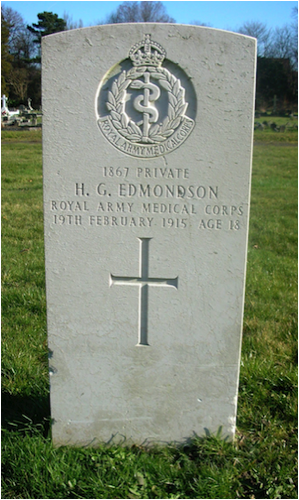Henry Gilbert Edmondson (sometimes 'Edmundson') was born in Gloucestershire and was posted in Chelmsford in the early months of the war. He was one of at least ten soldiers who were killed by a meningitis outbreak in Chelmsford in the early months of 1915.
EDMONDSON, HENRY GILBERT*,
Private, B Company, 3rd South Midland Field Ambulance
The matter is receiving the careful attention of the Local Government Board, the Town Council, and the Military Authorities, and every possible precaution is being taken to prevent the spread of the disease.
The Local Government Board state that the fever is not of a rare occurrence in the United Kingdom, and in the last forty years the malady has been known to be present in a considerable number of different localities in England and Wales, several of the outbreaks having taken place in recent years. The Board also state - Whether cerebrospinal fever is spread by direct infection from person to person is a matter of uncertainty; indeed, there is as yet no definite knowledge as to the war or ways in which the transmission may take place. Since, however,, the possibility of direct personal infection cannot, on the evidence available, be excluded, it will be wise to endeavour to secure, as far as practicable, the isolation of the sick from the healthy. It will also be advisable to apply suitable measures if disinfection to premises that have been occupied by the sick and to articles that may been in relation with them."
Henry was buried with full military honours in grave 92 at Chelmsford Borough Cemetery on 22nd February 1915. The service was conducted by the South Midland Division's Senior Chaplain, Rev. W. J. Selby. A large number of people watched the procession, which started from the Headquarters of the 4th Battalion of the Royal Berkshire Regiment in New London Road, Chelmsford; the band of that regiment playing the 'Dead March'. A firing party preceded the coffin, which was covered in the Union Flag and rested on a gun carriage of the Warwickshire Royal Field Artillery. Behind the coffin were the mourners who included Henry's mother, brother and the whole of the 3rd South Midland Field Ambulance, to the number of about 170 under Captain Herapath. At the close of the service three volleys were fired and the R.A.M.C. buglers sounded the 'Last Post'.
The grave already contained the remains of Hedley James who had been been buried in 1892 after dying aged 74.
Henry is commemorated by the 3rd South Midland Field Ambulance's memorial at Bristol Cathedral.
The military victims of the 1915 outbreak of cerebro-spinal meningitis in Chelmsford included:
Harold Leach - 24th January 1915
Charles William Giles - 25th January 1915
Ernest Stone - 8th February 1915
Frederick Sims - 11th February 1915
Bertie Ames - 17th February 1915
William Ernest Bruton - 17th February 1915
Henry Gilbert Edmondson - 19th February 1915
William Andrew - 20th February 1915
Frederick James Andrewartha - 26th February 1916
Thomas Charles Tooth - 4th March 1915
Walter Ernest Harris - 22nd March 1915
Samuel Herbert Bolton - 25th March 1915
141209

Henry was born in Bristol, Gloucestershire on 18th November 1896, the son of Edward Charles Edmondson (1858-1901) and Amelia Oke Edmondson (nee Rogers) (1856-1930).
The 1901 census found Henry with his parents, two brothers and a boarder in Bristol. A decade later the census recorded him, aged 13, living with his widowed brother and two siblings in Bristol. At the time he was an errand boy.
During the First World War Henry served as Private 1867 in "B" Company of the 3rd South Midland Field Ambulance. In the early months of the war the Ambulance and comrades of the army's South Midland Division were billeted in the Chelmsford area. Henry lived at the Kenilworth Hospital in Chelmsford, which had been established by the military and local authorities in response to an outbreak of meningitis in the Chelmsford area.
On 19th February 1915 Henry died from meningitis in the Oaklands Military Hospital in Chelmsford after an illness of over a week's duration. He was aged 18 and had been progressing well up to the previous day when he had a relapse. At the time of his death he had served in the army for two years. He had been working as a nurse orderly at Oaklands before his death. Henry was one of a number of soldiers who died in a meningitis outbreak in Chelmsford in the early months of 1915.
Such was the local anxiety about the event that the Chelmsford Borough Council's Town Clerk, George Melvin had issued an official
statement on the matter on 18th February 1915:
"Some cases of cerebrospinal fever having recently occurred in the Borough of Chelmsford, and exaggerated statements as to the extent of the outbreak having gained currency, it is officially stated on the authority of the Sanitary Committee and the Medical Officer of Health that the exact number of cases of this disease existing at present in the Borough at the present time is 11. Since the original outbreak some few weeks ago the total number of cases in Chelmsford including those mentioned above, has been 17 - 13 military and 4 civil - and the total number of deaths which have occurred is six (a seventh was to occur later in the week of the statement).